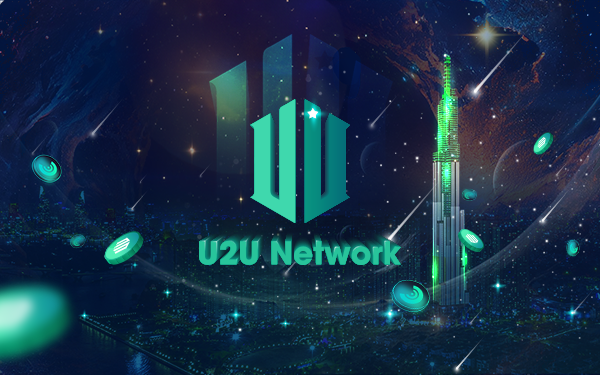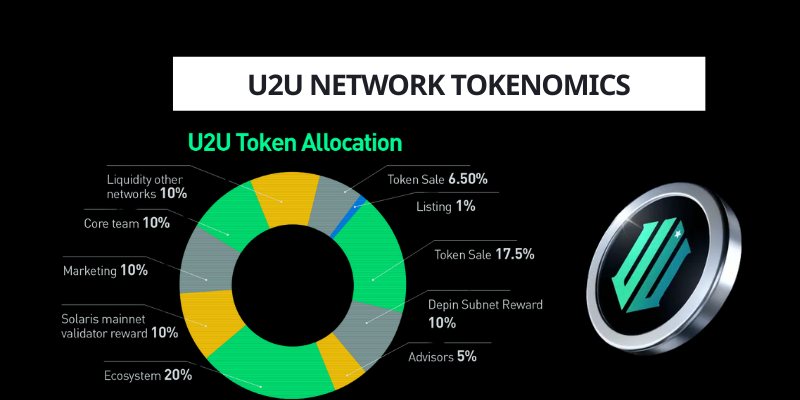In the rapidly evolving world of blockchain, U2U Network stands out as a Layer 1 blockchain optimized for Decentralized Physical Infrastructure Networks (DePIN). By combining Directed Acyclic Graph (DAG) technology with EVM compatibility, U2U Network delivers unparalleled scalability and performance. Central to its ecosystem is the $U2U token, which fuels transactions, governance, and incentives. This article explores U2U Network tokenomics, shedding light on its structure, utility, and role in DePIN innovation.
Overview of U2U Network
U2U Network is a modular blockchain platform designed to support real-world applications, particularly in the DePIN sector. Its core components, the U2U Chain and U2U Subnet, enable developers to build scalable, secure, and efficient decentralized applications (dApps). With features like the Helios Consensus Algorithm and subnet technology, U2U Network processes up to 72,000 TPS with a 650ms finality time, making it ideal for industries such as IoT, logistics, and cloud storage.

Breaking Down U2U Network Tokenomics
The $U2U token is the lifeblood of the U2U Network, with a total supply of 10 billion tokens. The tokenomics are structured to incentivize participation, support DePIN projects, and ensure long-term ecosystem growth. Here’s a closer look:
Token Supply and Distribution
- Total Supply: 10 billion $U2U tokens.
- DePIN Rewards: 1 billion tokens (10% of the supply) are reserved for DePIN Subnet Node operators, distributed over 30 years on a halving schedule.
- Funding Success: U2U Network raised $13.8 million from top investors, including KuCoin Ventures and IDG Blockchain, and an additional $300,000 through a public sale in August 2024 at $0.006 per token.
DePIN Reward Schedule
To encourage sustained participation, the 1 billion tokens allocated for DePIN Subnet Node operators are distributed as follows:
- Year 2: 500 million $U2U.
- Year 6: 125 million $U2U, totaling 875 million.
- Year 10: 31.25 million $U2U, reaching 968.75 million.
- Year 20: 976,563 $U2U, totaling 999.02 million.
- Post-Year 20: Rewards halve every two years, ensuring sustainability.
- $U2U Token Utility
The $U2U token is a multi-faceted utility token that powers the U2U ecosystem:
- Gas Fees: Covers transaction and smart contract costs.
- Staking Rewards: Validators stake $U2U to secure the network and earn rewards.
- Governance: Enables token holders to vote on protocol upgrades and resource allocation.
- Incentives: Rewards DePIN contributors and node operators.
- Trading: Available on exchanges like Bitget, MEXC, and KuCoin for liquidity.

The Role of Tokenomics in DePIN Innovation
U2U Network’s tokenomics are tailored to support DePIN, a sector that integrates physical infrastructure with blockchain technology. By allocating 10% of the token supply to node operators, U2U incentivizes the development of decentralized networks for IoT, storage, and more. The subnet architecture ensures that dApps can scale independently, reducing mainnet congestion and enhancing performance.
Airdrop and Community Engagement
In December 2024, U2U Network launched its Airdrop Season 1, rewarding users who completed the Solar Adventure by collecting eight Planet NFTs. Additionally, the Incentivized Mainnet Campaign distributed 10 million $U2U tokens to participants who bridged USDT to the U2U Chain. These initiatives have strengthened community ties and driven adoption.
Why Invest in U2U Network?
U2U Network’s tokenomics offer a compelling case for investors and developers. The platform’s focus on DePIN, combined with its scalable architecture and strong investor backing, positions it for growth. However, like all cryptocurrencies, $U2U is subject to market volatility, so thorough research is essential before investing.
U2U Network tokenomics are a blueprint for building a scalable, decentralized future. With a 10 billion token supply, a robust reward system, and versatile utility, $U2U is set to drive innovation in the DePIN ecosystem. Stay updated on U2U’s progress by following their official website or trading $U2U on platforms like Gate.io.

